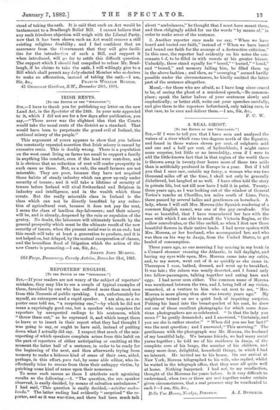MR. BRADLAUGH AND THE OATH.
[TO THE EDITOR OF THE " SPECTATOR.1
SIR,—One of the most troublesome questions which will occupy the attention of Parliament as soon as it meets will be the right of the Junior Member for Northampton to take his seat. There seems to be an impression that steps may be taken in favour of allowing him to take the oath, as he claims to do. As an independent Liberal Member, I would express my hope that no such course may be pursued.
It is urged that "the right of the Junior Member for North- ampton to take the oath ought to be supported, not for his sake, but for the sake of a principle much more im- portant than himself or any individual." With that opinion I should have agreed, and would have readily supported any such claim of the Member for Northampton, if it were made to the House of Commons without any further modification. But when Mr. Bradlaugh first attempted to take his seat, in May, 1880, he claimed to affirm, instead of taking the oath, because, as he afterwards informed the Select Committee, in a document which was put in as evidence, he considered that "the oath included words of, to him, idle and meaningless character."
Those words—those sentiments—he has never withdrawn ; they still stand, unimpugned, on the records of the House of Com- mons. That they must be taken into consideration whenever Mr. Bradlaugh claims to take the oath is clearly the opinion of Mr. Speaker, for it can have been only on that ground that he allowed a debate to arise when Mr. Bradlaugh claimed to take the oath on April 26th, 1881. On a later occasion, when doubt was thrown on the religions belief of another Mem- ber claiming to take the oath, the House having no official cognisance of that Member's belief, Mr. Speaker declined to allow any debate, and administered the oath. I believe that there are many Liberal Members in the House who, like myself, would have an extreme dislike to supporting by their votes, and thereby taking the responsibility of, an act which they conscientiously believe to be profane. I sincerely hope, after what has passed, that Mr. Bradlaugh may not be allowed to enter the House through the portals of the oath. But through some portals he must enter, duly elected as he has been by the constituency of Northampton. The day has gone by, never to return, when we could make "The symbols of atoning grace
An office-key, a picklock to a place ;"
and I hope that we may before long see an end put to this controversy, by allowing Mr. Bradlaugh to make an affirmation, and then take his seat. The lawyers say this cannot be per- mitted by the existing law. Then I hope the law may be promptly altered, and that any one who so desires it may be permitted, on entering the House, to make an affirmation, stead of taking the oath. It is said that such an Act would be tantamount to a Bradlaugh Relief Bill. I cannot believe that any such frivolous objection will weigh with the Liberal Party, now that it has been shown such an Act would remove a still existing religious disability ; and I feel confident that an assurance from the Government that they will give facili- ties for the introduction of such a Bill, and support it when introduced, will go far to settle this difficult question. The support which I should feel compelled to refuse Mr. Brad- laugh, if he claims to take the oath, I will willingly give to a Bill which shall permit any duly-elected Member who so desires to make an affirmation, instead of taking the oath.—I am, Sir, (to.,FRANCIS WILLIAM BUXTON.
42 Grosvenor Gardens, S. W., December 28th, 1881.















































 Previous page
Previous page